Tag : Amy Stone
April 20, 2020 by admin
The Finzi-Continis at 50
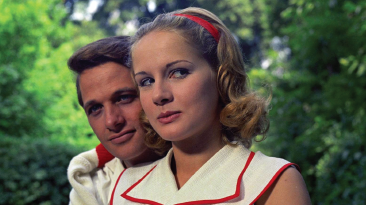
The Finzi-Continis at 50 2020 marks the 50th anniversary of Vittorio De Sica’s “The Garden of the Finzi-Continis.” It’s the tale of an elite Jewish family sequestered behind the walls of their Ferrara estate, ignoring the cascade of Jewish restrictions in Mussolini’s Italy until too late. Back in 1972, the film changed my life. Now I’m reliving it.
When I saw the film with my parents at the New Rochelle art film theater on Main Street, I identified with the protagonists, the aristocratic Finzi-Continis, at play on their tennis court, in their gated garden. When they, too, get deported along with the poorer Jews, I thought, “if I’m ever going to be taken away for being Jewish, I want to know what Jewish is.” So I moved to Israel. And it changed my life.
Approaching an old love after almost 50 years is fraught. What if that love—De Sica’s Oscar-winning film—has faded, become unbearably dated? What if my bold decision to head for Israel right after the Munich massacre of the Israeli Olympic team now seems naïve? It never occurred to me to study Yiddish, my ancestral language, even though my family hasn’t been in Israel for at least a thousand years.
In fact, viewing the film on my computer, most seems unfamiliar. But the beautiful scenes are still beautiful—all those young blonde Christians at play in their elegant tennis whites on the Finzi-Contini tennis court, riding in on their bicycles when the young Finzi-Continis have been barred from the Ferrara tennis club. And the young Finzi-Continis are equally blonde and beautiful—the elegant Micòl and the frail Alberto. Not a Jewish stereotype in sight. The garden, a huge estate in the center of town, is ravishing, flowers seemingly forever in bloom—a Garden of Eden. When the beautiful young Alberto dies of an unspecified disease, his burial in a Jewish cemetery is almost a shock. Since I was visiting my parents for Passover, I was probably struck by the contrast of the joyful singing at another family’s seder followed by the apparently sederless Finzi-Continis formally wishing a visitor a happy Passover.
What I remember are the final scenes—three generations of Finzi- Continis taken away by Fascists in business suits. Their servants, presumably illegally employed Christians, look on silently. Unlike the other Jews rounded up for deportation, they’re not even prepared with little suitcases. The beautiful Micòl remains aristocratic to the end—correcting the fascist mispronouncing her name. And the film’s final wrenching music— when I first saw it, I’m sure I couldn’t have identified it as El Maleh Rahamim, the Jewish prayer for the dead.
When the film moved me back then, I quit my U.S. job and spent a year in Israel.
AMY STONE, “Return to the Garden of the Finzi-Continis,” on the Lilith Blog.
- 1 Comment
April 8, 2014 by admin
Jewish Filmmaking—Curse or Calling?
it’s dangerous to go to jewish film festivals. It could turn you into a Jewish filmmaker.
One Jewish film’s OK, but two? You’re on dangerous ground.
Back in 2005, Diana Groó, Hungarian filmmaker, was in Amsterdam to show her first feature, “Miracle in Krakow,” at the Jewish film festival. When Rabbi Elisa Klaphek approached her to make a film on Regina Jonas, the world’s first woman rabbi (ordained in Berlin in 1935) and the subject of a biography Klaphek had written, Groó resisted. ‘”My first feature was Jewish. I wanted to make something different.”
Her next film, “Vespa,” was a road film about a 10-year-old Roma boy who rides a motor scooter from the countryside to Budapest. It’s a mix of documentary and fiction. Groó, who characterizes herself as part of the artistic underground, knows she’s not going to win establishment friends in Hungary as she keeps gravitating toward sensitive social issues. She says that Roma (once called Gypsies), Jews and homosexuals are today the main targets for Hungarian neo-Nazis and nationalists.
By the time Groó got interested in Rabbi Regina Jonas, all those who knew Jonas — and whom Klaphek had interviewed — were no longer alive. But Groó did it — without “expert” talking heads or slow pans over documents. “Regina” is, in the filmmaker’s words, “a poetic documentary.” It’s based on a single photograph and a trove of letters and newspaper clippings Jonas had safeguarded from the Nazis. (See “Meet on Screen the First Woman Rabbi,” https://archive.lilith.org/blog) Not just Groó’s calling card at Jewish film festivals, “Regina” was also screened at the UNESCO Palace in Paris for this year’s International Holocaust Remembrance Day.
It’s hard to believe Groó, born in 1973, needs to keep proving that she’s not afraid to be Jewish.
She and her identical twin sister grew up in Budapest, where their own Jewish history was never discussed. At 10, they were determined to find out their family story from their maternal grandmother, who had survived four concentration camps. “One of my first memories, at the age of four, was seeing the number from Auschwitz on my grandmother’s arm.” Their own mother only found out at age eight — from Jewish classmates — that she was Jewish. Groó’s parents’ generation “got a kind of silence. My grandparents’ generation stopped talking about their Judaism. They just decided to start a new life and tried to save us from the past.”
Groó speaks of herself as part of the traumatized third generation. “We broke the silence,” she says. “We wanted to know everything.” Groó was 17 when she first fasted on Yom Kippur. “It wasn’t for religious reasons,” she says. “My grandmother was 17 when she was deported. She came from a big family and was the only one who survived. Fasting was the minimum I could do.” And now — “I want to be a proud Jew, but I’m always reminded in a negative way that I am Jewish.” She’s received hate mail, and quotes one letter: “You are a dirty Jew who makes film and humiliates Hungarian blood. You are betraying the country.”
With responses like that, what will her next film be? After the meticulously researched documentary “Regina,” she had wanted to make a feature film on the life of Rabbi Jonas. The story has everything –defiance, impoverished beginnings, a brilliant mind, an almost mystical call to the religious life, guts and determination, and, at the end, true love in the shadow of the Holocaust.
But modern Hungary is pushing Groó into what she considers a more urgent subject. She doesn’t mince words: “I live in a country where neo-Nazis in military uniform march on the streets and the current right-wing government does not stand up against racism. Choosing a Jewish topic comes always from a painful feeling, that I lost something from the past, or the stories simply find me and I cannot resist.”
She accuses her native land of continuing to deny its past: “Hungary was one of the last countries, in 1944, in the last minute, that offered its Jews to the Nazis. Hungary is still one of the countries not able to face its history. What’s missing is education.”
Lest there be doubt, at Easter time two years ago, a member of the extreme right in Parliament dragged up the 1883 blood libel against Jews accused of killing a Hungarian peasant girl. The MP, Zsolt Baráth, was accused of anti-Semitism and urged to resign for criticizing the 19th century verdict that found the Jews innocent. This is not enough for Groó: “One hundred and thirty years after this false accusation, it can’t happen again. I decided to make a film about the lawyer who defended the Jewish people. I want to open people’s eyes to what really happened.”
What film would she make if she had an unlimited budget and could pick any subject? She pauses. “I’d probably make the films I’m making right now.”
- 1 Comment
Feminists In Focus, The Lilith Blog
February 12, 2014 by Amy Stone
Meet on Screen the First Woman Rabbi
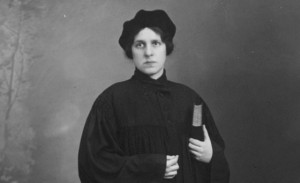
via filmlinc.com
How do you make a documentary about Regina Jonas, the world’s first woman rabbi, when only one photograph survives?
It helps if you’re pushed to do the deed by Elsa Klapheck, the contemporary German rabbi whose book, Fraulein Rabbiner Jonas: The Story of the First Woman Rabbi, is the definitive source on this extraordinary woman, born in Berlin in 1902 and ordained in 1935. (The book has been translated into English by Lilith contributor Toby Axelrod. Klapheck, ordained in Frankfurt, is the first woman rabbi in the Netherlands.)
“Regina” — Diana Groó calls her film “a poetic documentary” of Regina Jonas — made its U.S. premiere in January at the 23rd NY Jewish Film Festival, presented by the Film Society of Lincoln Center and The Jewish Museum. The 63-minute film is in English.
Groó, 40, who seems either doomed or destined to be identified as a Jewish Hungarian filmmaker, stayed true to the hundreds of documents Regina Jonas managed to save for posterity. The poetry comes with the archival footage – going back to 1900s Berlin — combined with music and voices. British actress Rachel Weisz is the voice of Regina Jonas. Others giving life to archival material include Groó’s grandmother, 86, the same age as Jonas’s students would have been, and a survivor of four concentration camps.
- No Comments
June 25, 2012 by Amy Stone
Feminists in Focus: Faigele Film Festival Kvels Over ‘DevOUT’
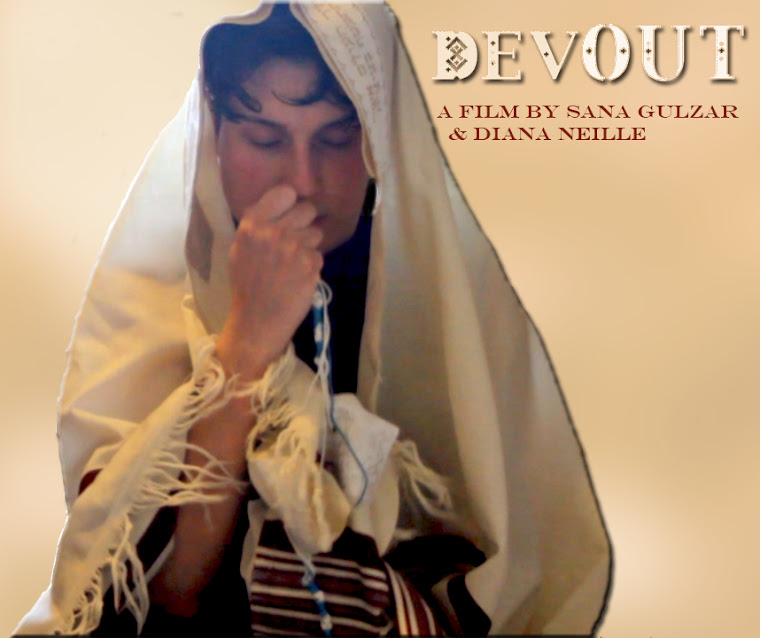 Thank God the Jews don’t have a pope.
Thank God the Jews don’t have a pope.
While the Vatican is denouncing Sister Margaret Farley’s “Just Love: a Framework for Christian Sexual Ethics” with its defense of same-sex marriage, the JCC in Manhattan is celebrating all things LGBTQ-Jew with its month-long Gay Paree. The June festivities started with the Seventh Annual Faigele Film Festival (a one-night stand of two films). Not just a JCC thing, Conservative Judaism promulgated wording for same-sex marriage ceremonies – and divorces – in time for June weddings and Gay Pride Day.
But in Orthodox communities don’t expect any openly passionate same-sex hand holding on either side of the mechitzah.
Quick cut to the Faigele Film Festival’s screening of “DevOUT,” the 37-minute video where lesbian Orthodox Jews explain why they want to be true to both their faith and their sexuality. Proof that sisterhood is powerful, the video was made by two straight women, neither of them Jewish. One Christian, one Muslim, Diana Neille from South Africa and Sana Gulzar from Pakistan won the trust of the women involved to produce the video as their 2011 Columbia Journalism School master’s project. They were quick studies. The soundtrack includes sinuously sensual klezmer music from New York’s Isle of Klezbos sextet.
- 1 Comment
May 15, 2012 by Amy Stone
On the Dangerous Dykes Book Tour
 This past week was a good one. President Obama finally came out in support of same-sex marriage. In contrast, homophobia still holds sway in the worlds of Orthodox Judaism, even within the enlightened academic stronghold of modern Orthodoxy — Yeshiva University (YU) and its women’s undergraduate school, Stern College, both in Manhattan.
This past week was a good one. President Obama finally came out in support of same-sex marriage. In contrast, homophobia still holds sway in the worlds of Orthodox Judaism, even within the enlightened academic stronghold of modern Orthodoxy — Yeshiva University (YU) and its women’s undergraduate school, Stern College, both in Manhattan.
Two days before Obama made his announcement, a crowd of more than 100 piled into the offices of JOFA (Jewish Orthodox Feminist Alliance) for the book tour of the anthology Keep Your Wives Away from Them – Orthodox Women Unorthodox Desires. The event was sponsored with Eshel, an organization working to build support for lesbian, gay, bisexual and transgender Jews in traditional Jewish communities.
You’ve got to love a book whose cover looks like a photo from yesteryear of a sweet looking dyke in drag, straight out of the shtetl. The book’s essays speak personally and halachically (according to Jewish law) of lesbian, bi and transgender sexuality within Orthodox Judaism. The book tour’s goal is to connect traditionally Jewish and Orthodox lesbian, bi, trans and queer people to each other and to raise awareness in the Jewish community about being LGBTQ and Orthodox.
- 3 Comments
February 1, 2012 by Amy Stone
Reporting back from the New York Jewish Film Festival: But would you go there? ‘Welcome to Kutsher’s: The Last Catskills Resort’
(The New York Jewish Film Festival, presented by The Jewish Museum and the Film Society of Lincoln Center,ended Jan. 26. Look for these films at other festivals and, hopefully, in commercial distribution.)
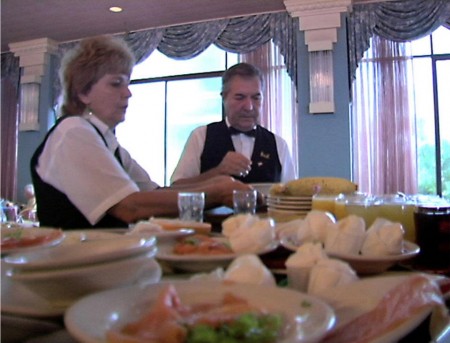 What does it say about the state of American Judaism that the New York Jewish Film Festival’s final offering was the documentary “Welcome to Kutsher’s: The Last Catskills Resort”? Sad to say, we are talking the resort of last resort.
What does it say about the state of American Judaism that the New York Jewish Film Festival’s final offering was the documentary “Welcome to Kutsher’s: The Last Catskills Resort”? Sad to say, we are talking the resort of last resort.
The Kutsher’s story testifies to the drive and determination that made Kutsher’s a piece of Jewish Americana for more than a century. This is the tale of three generations of Kutshers who oversaw the rise and watched the demise of the resort formula they perfected. Three meals a day – all the kosher food you could eat; free, top-flight entertainment; fun for the whole family; and the Kutsher niche – famous athletes on staff.
There was plenty of room for strong women in the Kutsher family. In 1907, Louis and Max Kutsher and Max’s wife, Rebecca, had saved enough money as tailors on the Lower East Side to buy farmland in Sullivan County in upstate New York. Like other Jewish farmers, they took in boarders from the Lower East Side. When guests turned out to be more profitable than chickens and cows, the Jewish resort business was born, responding to working-class Jews finally able to afford vacations but barred from gentile-only resorts.
- No Comments
January 30, 2012 by Amy Stone
Reporting back from the New York Jewish Film Festival: Recreating the Past – Incessant Visions: Letters From an Architect
(The New York Jewish Film Festival, presented by The Jewish Museum and the Film Society of Lincoln Center, at www.thejewishmuseum.org/
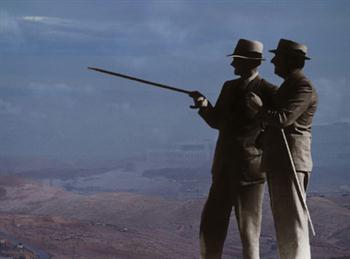 Tiny sketches sent by a young Jewish architect from the German-Russian front in World War I to woo a beautiful 16-year-old cellist in Berlin paid off.
Tiny sketches sent by a young Jewish architect from the German-Russian front in World War I to woo a beautiful 16-year-old cellist in Berlin paid off.
Erich Mendelsohn, a visionary architect whose curvaceous organic sketches could have grown into Frank Lloyd Wright’s Guggenheim Museum, won the hand of Louise Maas. Growing up in a wealthy German Jewish merchant family and studying cello at the Royal Conservatory in Berlin, she defied her father. At 21, she married the poor Jewish architect from East Prussia.
But it worked. Thanks to his talent and her connections, Mendelsohn became the most sought after architect in Berlin – until commissions dried up and they fled the Nazis.
His monumental works have mostly vanished from the earth – bombed by Allied forces – but Erich Mendelsohn and his beloved Louise are brought back to life in Israeli filmmaker Duki Dror’s “Incessant Visions: Letters From an Architect.”
- No Comments
January 24, 2012 by Amy Stone
Feminists in Focus: Reporting back from the New York Jewish Film Festival Mission Accomplished for ‘Bottle in the Gaza Sea’
(Check the calendar for the festival, presented by The Jewish Museum and the Film Society of Lincoln Center, at www.thejewishmuseum.org/
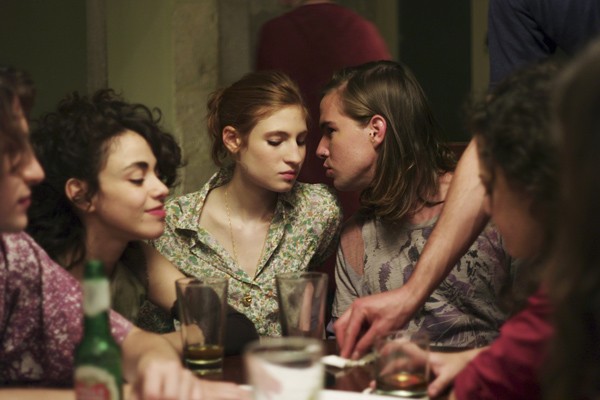 What a coup for the most political film at this year’s NY Jewish Film Festival – “A Bottle in the Gaza Sea” — to make its world premiere at the festival. And how encouraging to see that fresh and touching ground remains to communicate the message that the bloodshed between Israelis and Palestinians is too inhuman to continue.
What a coup for the most political film at this year’s NY Jewish Film Festival – “A Bottle in the Gaza Sea” — to make its world premiere at the festival. And how encouraging to see that fresh and touching ground remains to communicate the message that the bloodshed between Israelis and Palestinians is too inhuman to continue.
Tal, a teen whose family has moved from France to Jerusalem, slips a message into a bottle saying that she refuses to accept that only hatred can exist between Israelis and Palestinians. She gets her brother to throw the bottle into the ocean while he’s on army duty near Gaza. An e-mail response to “bottleaccess” eventually comes from “Gazaman.”
The resulting e-mails become poignant when terrorist attacks in Jerusalem are met with Israeli air strikes in Gaza.
The film is based on the award-winning novel of the same name by French writer Valérie Zenatti, who spent her teen years in Israel. (Her earlier book, “When I Was a Soldier,” about her life in the Israeli army, was reviewed in Lilith.)
- No Comments
January 20, 2012 by Amy Stone
Feminists in Focus: Reporting back from the New York Jewish Film Festival Peeling Away the Layers of ‘Restoration’
(Check the calendar for the New York Jewish Film Festival, presented by The Jewish Museum and the Film Society of Lincoln Center, at www.thejewishmuseum.org/
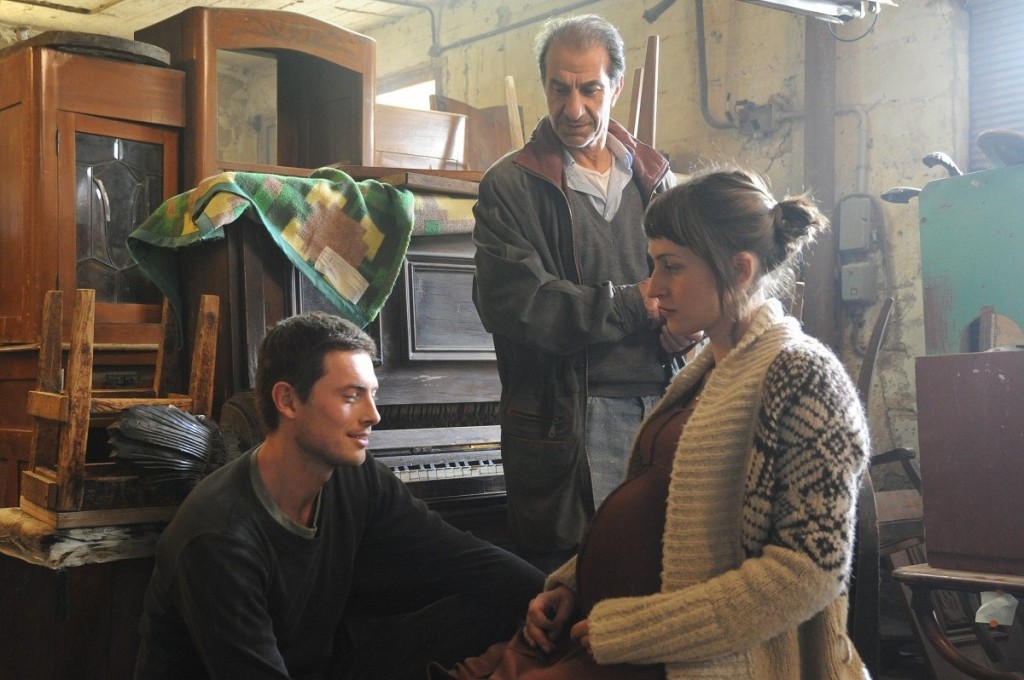 Finely crafted is the operative phrase for “Restoration.” The 2010 Israeli film (English subtitles) directed by Joseph Madmony tells the tale of Fidelman, an aging restorer of antique furniture stubbornly trying to hang onto his business. Starring Sasson Gabai (“The Band’s Visit”), “Restoration” unfolds with exquisite twists and turns that won it the Dramatic Screenwriting Award at this year’s Sundance Film Festival and several prizes at the Jerusalem Film Festival. (Madmony collaborated with Erez Kav-El on the script.)
Finely crafted is the operative phrase for “Restoration.” The 2010 Israeli film (English subtitles) directed by Joseph Madmony tells the tale of Fidelman, an aging restorer of antique furniture stubbornly trying to hang onto his business. Starring Sasson Gabai (“The Band’s Visit”), “Restoration” unfolds with exquisite twists and turns that won it the Dramatic Screenwriting Award at this year’s Sundance Film Festival and several prizes at the Jerusalem Film Festival. (Madmony collaborated with Erez Kav-El on the script.)
Set in a timeless corner of Tel Aviv, it takes cell phones and a digital camera with video option to make clear we’re in the present.
Enter Anton (Henry David), the mysterious drifter who becomes Fidelman’s assistant. Add Fidelman’s estranged son, Noah (Nevo Kimchi), and his very pregnant wife, Hava (Sarah Adler). And there’s the impact beyond the grave of his freshly deceased partner, Malamud, who managed the shop’s finances.
- No Comments
January 20, 2012 by Amy Stone
Feminists in Focus: 21st Annual NY Jewish Film Festival Opens With ‘Flood’
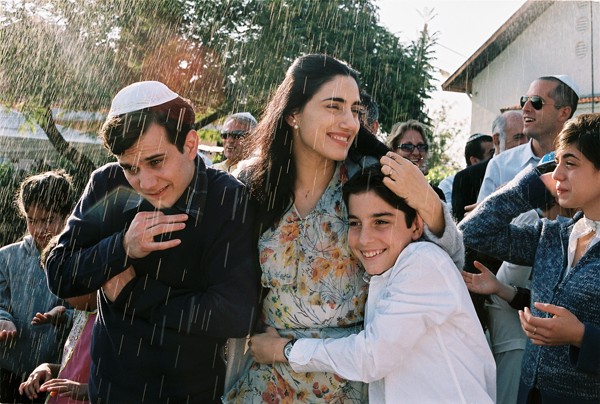 You can’t accuse the New York Jewish Film Festival of being a front for Zionist propaganda, especially with the festival opener “Mabul” (The Flood).
You can’t accuse the New York Jewish Film Festival of being a front for Zionist propaganda, especially with the festival opener “Mabul” (The Flood).
(Check the calendar for the festival, presented by The Jewish Museum and the Film Society of Lincoln Center, at www.thejewishmuseum.org/
The Israeli-Canadian-French co-production, in Hebrew with English subtitles, could well be a film for the Manhattan JCC’s Other Israel film festival, with tales of the unhappy side of the Jewish State. There’s Yoni, the young bar mitzvah boy, earning money doing homework for the school bullies; his non-functioning pot-smoking crop pilot father; his gorgeous mom – a Mediterranean beauty – sweetly running a nursery school but screwing one of her young charges’ parents; and, if that weren’t enough, Tomer, the older brother, autistic to the point of needing constant care, back with the non-functional family when his institution goes bankrupt.
Welcome to life in the modern Jewish State. Who knew that an Israeli institution caring for the severely disabled could go bust. What a touch that the film’s one handsome Zionist-dream male is a philanderer. And that male-female roles remain entrenched unto the next generation, with the bar mitzvah boy berating his stressed-out mom for not taking adequate care of his disabled brother.
- No Comments
 Please wait...
Please wait...